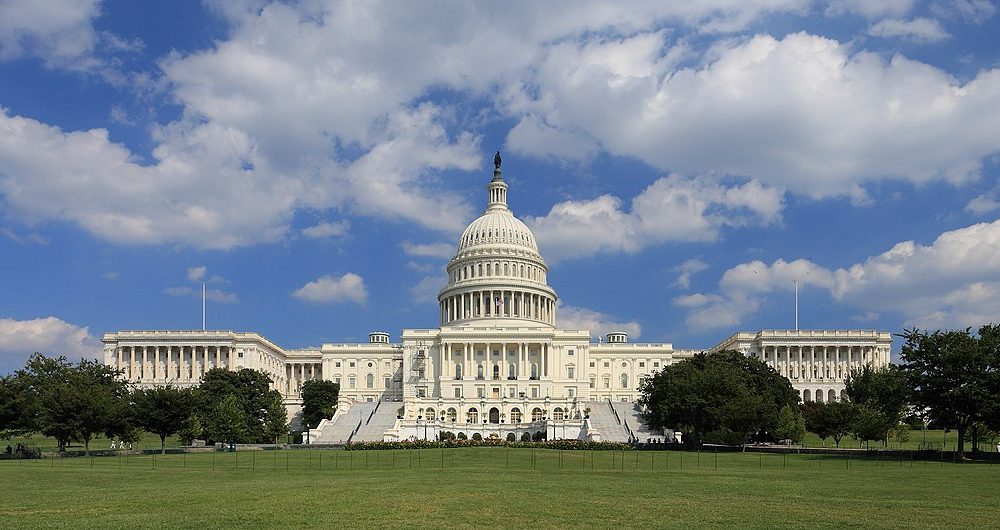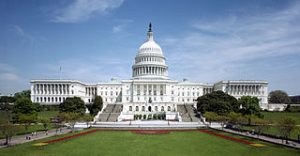February 4, 2021 •
Spotlight Act: US Senate Bill to Enhance Disclosure of Financial Political Activity Reintroduced

US Capitol - by Martin Falbisoner via Wikimedia Commons
On February 3, U.S. Senators Jon Tester and Ron Wyden reintroduced a bill to reverse a U.S. Treasury Department’s decision limiting IRS disclosure requirement of certain tax-exempt organizations engaging in political activities. Senate Bill 215, the Spotlight Act, requires non-profit […]
On February 3, U.S. Senators Jon Tester and Ron Wyden reintroduced a bill to reverse a U.S. Treasury Department’s decision limiting IRS disclosure requirement of certain tax-exempt organizations engaging in political activities.
Senate Bill 215, the Spotlight Act, requires non-profit organizations engaging in political activity, such as donating to candidates and purchasing political ads, provide the IRS with the names and basic information of donors who contribute more than $5,000.
The bill repeals an IRS revenue procedure exempting certain tax-exempt organizations that are not 501(c)(3) organizations from the requirement to report the names and addresses of substantial contributors (persons who contribute more than $5,000 per year) on information returns that are filed with the IRS. The proposed legislation requires tax-exempt organizations falling under sections 501(c)(4), 501(c)(5), and 501(c)(6) of the Internal Revenue Code (e.g., social welfare organizations, labor organizations, business leagues) to disclose the names and addresses of all substantial contributors on their returns. The bill also eliminates the authority of the IRS to provide exceptions to the disclosure requirements for tax-exempt organizations.
A version of the Spotlight Act was first introduced by the Senators in 2018
September 27, 2018 •
US Senate Joint Resolution Seeks to Reverse IRS Disclosure Exemption for Certain Tax-Exempt Organizations
On September 24, U.S. Senators Jon Tester and Ron Wyden introduced a resolution to reverse a U.S. Treasury Department’s decision limiting IRS disclosure requirements of certain tax-exempt organizations engaging in political activities. On July 16, the U.S. Treasury Department and […]
 On September 24, U.S. Senators Jon Tester and Ron Wyden introduced a resolution to reverse a U.S. Treasury Department’s decision limiting IRS disclosure requirements of certain tax-exempt organizations engaging in political activities.
On September 24, U.S. Senators Jon Tester and Ron Wyden introduced a resolution to reverse a U.S. Treasury Department’s decision limiting IRS disclosure requirements of certain tax-exempt organizations engaging in political activities.
On July 16, the U.S. Treasury Department and the IRS announced certain tax-exempt organizations are no longer required to report the names and addresses of contributors on their annual reports.
This exemption from reporting applies to tax-exempt organizations generally not receiving tax-deductible contributions, such as the National Rifle Association, labor unions, volunteer fire departments, issue-advocacy groups, local chambers of commerce, veterans’ groups, and community service clubs. These organizations are still required to continue to collect and keep the donor information and to make it available to the IRS upon its request.
This exemption does not affect the information required to be reported by charities primarily receiving tax-deductible contributions, such as 501(c)(3) organizations, certain nonexempt private foundations, or 527 political organizations.
Senate Joint Resolution 64, The Spotlight Act, would overturn the exemption and require disclosure to the IRS of the names and information of donors who contribute more than $5,000.
April 24, 2013 •
Bi-Partisan Campaign Finance Bill Introduced in U.S. Senate
The Follow the Money Act of 2013
Leaders of corporations, unions, and other organizations responsible for independent political advertisements may have to be identified if a bill introduced in the U.S. Senate yesterday passes.
Senate Bill 791 was introduced jointly by Senators Ron Wyden (D-Ore.) and Lisa Murkowski (R-Alaska). The bi-partisan bill, called The Follow the Money Act of 2013, requires entities, regardless of tax status, to identity the funders of any political activity in which the entity engages.
An organization involved in political activity not regulated under the Federal Election Campaign Act will also be subject to a separate set of Internal Revenue Service penalties, including the possible loss of its federal tax exemption.
The Federal Election Commission will be required to replace quarterly reporting with a more frequent reporting schedule and will be required to disclose the information to the general public upon receipt.
Senator Wyden’s press release can be found here.
Video courtesy of Sen. Wyden’s YouTube channel.
State and Federal Communications, Inc. provides research and consulting services for government relations professionals on lobbying laws, procurement lobbying laws, political contribution laws in the United States and Canada. Learn more by visiting stateandfed.com.

